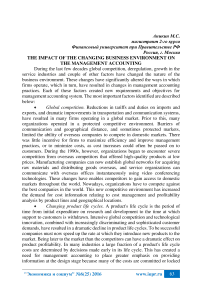The impact of the changing business environment on the management accounting
Автор: Аникин М.С.
Журнал: Экономика и социум @ekonomika-socium
Статья в выпуске: 6-1 (25), 2016 года.
Бесплатный доступ
Короткий адрес: https://sciup.org/140120457
IDR: 140120457
Текст статьи The impact of the changing business environment on the management accounting
During the last few decades global competition, deregulation, growth in the service industries and couple of other factors have changed the nature of the business environment. These changes have significantly altered the ways in which firms operate, which in turn, have resulted in changes in management accounting practices. Each of these factors created new requirements and objectives for management accounting system. The most important factors identified are described below:
-
• Global competition. Reductions in tariffs and duties on imports and
exports, and dramatic improvements in transportation and communication systems, have resulted in many firms operating in a global market. Prior to this, many organizations operated in a protected competitive environment. Barriers of communication and geographical distance, and sometimes protected markets, limited the ability of overseas companies to compete in domestic markets. There was little incentive for firms to maximize efficiency and improve management practices, or to minimize costs, as cost increases could often be passed on to customers. During the 1990s, however, organizations began to encounter severe competition from overseas competitors that offered high-quality products at low prices. Manufacturing companies can now establish global networks for acquiring raw materials and distributing goods overseas, and service organizations can communicate with overseas offices instantaneously using video conferencing technologies. These changes have enables competitors to gain access to domestic markets throughout the world. Nowadays, organizations have to compete against the best companies in the world. This new competitive environment has increased the demand for cost information relating to cost management and profitability analysis by product lines and geographical locations.
-
• Changing product life cycles. A product's life cycle is the period of
time from initial expenditure on research and development to the time at which support to customers is withdrawn. Intensive global competition and technological innovation, combined with increasingly discriminating and sophisticated customer demands, have resulted in a dramatic decline in product life cycles. To be successful companies must now speed up the rate at which they introduce new products to the market. Being later to the market than the competitors can have a dramatic effect on product profitability. In many industries a large fraction of a product's life cycle costs are determined by decisions made early in its life cycle. This has created a need for management accounting to place greater emphasis on providing information at the design stage because many of the costs are committed or locked in at this time. Therefore, to compete successfully, companies must be able to manage their costs effectively at the design stage, have the capability to adapt to new, different and changing customer requirements and reduce the time to market of new and modified products.
-
• Advances in manufacturing technologies. Excellence in manufacturing can provide a competitive weapon to compete in sophisticated worldwide markets. In order to compete effectively, companies must be capable of manufacturing innovative products of high quality at a low cost, and also provide a first-class customer service. At the same time, they must have the flexibility to cope with short product life cycles, demands for greater product variety from more discriminating customers and increasing international competition. World-class manufacturing companies have responded to these competitive demands by replacing traditional production systems with lean manufacturing systems that seek to reduce waste by implementing just-in-time production systems, focusing on quality, simplifying processes and investing in advanced manufacturing technologies. Features of these new systems had a great influence on management accounting.
-
• Environmental issues. Customers are no longer satisfied if companies simply comply with the legal requirements of undertaking their activities. They expect company managers to be more proactive in terms of their social responsibility, safety and environmental issues. Environmental management accounting is becoming increasingly important in many organizations. There are several reasons for this. First, environmental costs can be large for some industrial sectors Second, regulatory requirements involving huge fines for non-compliance have increased significantly over the past decade. Therefore, selecting the least costly method of compliance has become a major objective. Third, society is demanding that companies focus on being more environmentally friendly. Companies are finding that becoming a good social citizen and being environmentally responsible improves their image and enhances their ability to sell their products and services. These developments have created the need for companies to develop systems of measuring and reporting environmental costs, the consumption of scarce environmental resources and details of hazardous materials used or pollutants emitted to the environment. Knowledge of environmental costs, and their causes, provides the information that managers need to redesign processes to minimize the usage of scare environmental resources and the emission pollutants and to also make more sensitive environmental decisions.
-
• Customer orientation. In order to survive in competitive environment companies have had to become more customer-driven and to recognize that customers are crucial to their future success. This has resulted in companies making customer satisfaction an overriding priority and to focus on identifying and achieving the key success factors that such as cost efficiency, quality, innovation and continuous improvement.
Thus, all factors mentioned above influenced management accounting system development, because each of them has unique requirements for information which should be provided to managers to support business decision process.
"Экономика и социум" №6(25) 2016


